HIT CHANNEL EXCLUSIVE INTERVIEW: September 2018. We had the great honour to talk again with a legendary guitarist: John McLaughlin. It’s been 6 years since our previous conversation. Now, we contacted John to discuss his new live album “Live In San Francisco”, featuring his own band, The 4th Dimension as well as Jimmy Herring & The Invisible Whip. Read below the very interesting things John told us:
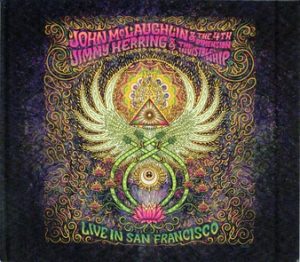 First of all, why you decided to retire from touring? You are in good shape.
First of all, why you decided to retire from touring? You are in good shape.
I don’t retire from touring. I retired from touring in America, because it’s very difficult to tour in America, the pay is very bad, taxes are very high… The only way to go to America is to go for a long time. This is why my last tour was 6 weeks. But I don’t want to go now for 6-week tour. My maximum tour is 2-3 weeks, but this is not possible in America. Don’t misunderstand me, I made the American tour really because I want to say “thank you” to the American people. Because I was in America from 1969 and I had the great fortune to play with Tony Williams and Miles Davis and all these wonderful musicians. I formed this group, Mahavishnu Orchestra, who was a fantastic success in America. Shakti was also formed in America. I have a lot to be grateful for to America. This is why when I planned the tour, I wanted to play the music of Mahavishnu, especially for the recording. It was not an ordinary show in America, because I asked Jimmy Herring, a great guitar player and he played Mahavishnu music like he wrote it. He’s amazing!
I have seen the show at the Capitol Theatre.
That was the very beginning of the tour! We had 6 weeks on the road, so it developed in such a beautiful way. It was a very interesting show. Jimmy would go and played one or two Mahavishnu tunes and then I played my set with The 4th Dimension and we played one or two Mahavishnu tunes, but the last set featured both bands of stage: Two drummers, two bass players, two keyboard players, two guitar players, a violin player and we played only Mahavishnu music and this is the CD (ed: “Live in San Francisco”). So, it really was my way to say “thank you” to the American people for giving me so much. Don’t misunderstand me when I say, I don’t tour America any more. It was really just to say “thank you”, but you know, now I don’t want to tour for 6 weeks or two months. It’s too difficult, too much for me, Thodoris! I want to tour less.
In this tour, you performed the Mahavishnu Orchestra tracks with Jimmy Herring and his band. What the double group configuration added to the original compositions?
The music of Mahavishnu is very powerful. The musicians of Jimmy’s band and my band, they all know a lot of Mahavishnu music and this is very powerful music and I made it full of courage. So, to play it with two drummers, two guitar players and two keyboard players –if you hear the record- it’s very powerful and beautiful like the original Mahavishnu, only even a little more, because it’s a long time ago. I wanted to give it an extra energy, extra love and affection from more musicians.
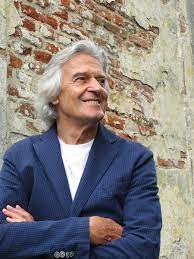 Before your final Meeting of the Spirits Tour, you listened to the old Mahavishnu Orchestra material after many years. Was it an emotional experience for you to go back in time?
Before your final Meeting of the Spirits Tour, you listened to the old Mahavishnu Orchestra material after many years. Was it an emotional experience for you to go back in time?
Of course, every time I listen to one of my old recordings, I have a very strong emotional experience, not just with Mahavishnu Orchestra, with Shakti, Paco (ed: de Lucia) and the three guitarists. Even go back to 1960’s from “Extrapolation” (1969), when I hear this music, because it’s me, it’s like a painting I did many years ago. But Mahavishnu was very special because it really was my first band. It was a new concept of music. I’m a jazz musician, but to survive and eat, I played rhythm and blues, rock and funk. All these influences impacted on me as a musician. With Mahavishnu I wasn’t trying to make fusion music. The fusion music made me. All the influences, including Hispanic influences. The first tune in “The Inner Mounting Flame” (1971), “Meeting of the Spirits”, had a very Hispanic influence. When I write music, I don’t say: “Ok, I’ll write a Hispanic tune”. No, the music comes, when it’s on and I write it and then we play it like that. I never know really, when I am starting. I never know. Of course, playing with Tony Williams and Miles Davis, they wanted music from me. So, the music that comes out is influenced by all these things: by jazz, Hispanic, funk, rhythm and blues. By the blues, the Mississippi Blues! Even classical music, because before I start to play guitar, I was playing classical piano.
I really like the electric version of “A Lotus on Irish Streams”, and especially Jason Crosby’s (violin, Fender Rhodes, vocals –Jimmy Herring & The Invisible Whip) performance. Why you changed it so radically?
Because for me, I hear it differently now. Don’t forget it: It’s 46 years ago! I hear the tune differently. I understand about the acoustic, but that was in 1971 and today I hear the melody with the two guitars. I want to hear the both guitars and to hear the both guitars, Ok, we made it electric. Just because I hear it like this, now. I am not the same as I was in 1971. I’m different now. I liked the version in 1971, but I really like this modern version with Jimmy. I have to say, I really enjoyed it. It was a pleasure to play with a guitar player who plays the music like he wrote it. Fantastic experience!
It is flattering that many great musicians like Phil Lesh (Grateful Dead), Steve Lukather, Derek Trucks and Sting attended shows of The Meeting of the Spirits Tour?
Yeah, but they are all dear friends! We are musicians. Even Sting. Yeah, he’s a big star for people, but basically he’s just a musician. When we speak together when we meet, he’s a singer, I’m a player. I’m very fortunate that these players enjoy my music. I enjoy their music too. I just saw Steve Lukather recently, when he was playing with Toto and also with the Ringo Starr Band. He’s very dear friend, but you know, he’s a guitar player. There is a very special friendship and camaraderie among guitar players. In fact, I just got a fantastic book (ed: “Sunshine of Your Love”) that came out from Genesis in England about The Crossroads Festival of Eric Clapton. I was in two of them. It’s a beautiful book and it’s only guitar players. Of course, there are drummers and keyboard players, but mainly are guitar players. Wonderful guitar players. When you look at this book, you see the affection and brotherly camaraderie between guitar players. This has always been like this. I love guitar, I love guitar players. We have a very close association. Even if you play bass guitar, like Sting or somebody else, we are still just musicians. But musicians are like one big family. Whether you are from Greece, whether you are from Canada or India or Africa, we are all one family, speaking one language: music.
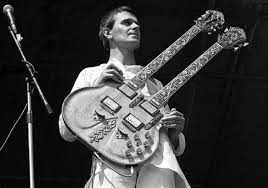 Last January, you won a Grammy Award for Best Improvised Jazz Solo for the live track “Miles Beyond” from your album “Live at Ronnie Scott’s”. What does this award mean to you?
Last January, you won a Grammy Award for Best Improvised Jazz Solo for the live track “Miles Beyond” from your album “Live at Ronnie Scott’s”. What does this award mean to you?
It’s very nice, because you get appreciation from your peers. They want to make a gesture. They enjoy your work, that your work is appreciated. This is very satisfying. It’s a very good feeling. What is ironic is that some people would disagree with you, that this is not really jazz solo. It’s much more fusion. If you listen to this solo, it’s really jazz fusion, because there is a rock element in this tune. It’s for Miles Davis, of course, “Miles Beyond”. I wrote it for him. It comes from 1972. It’s the last thing I expected. I didn’t expect to get a Grammy for this, but you see, you never know what is around the corner. Surprise, surprise.
What memories do you have of the Mahavishnu Orchestra tour with Frank Zappa & The Mothers of Invention in May 1973?
Frank was crazy, first of all, but very good musician. I have to remind you that I am a fan of The Mothers of Invention since 1966, their first album. Do you know this album, “Freak Out!”? The minute I heard this album, I am a fan of Frank Zappa. Of course, years later I met him but… two things: 1) He was a very good musician but he was a dictator in his band, I’m sorry to say (laughs). Plus, he was not only a dictator, but he was taking very long guitar solos. 10-15 minute guitar solos and really he should have taken 2 or 3 minute guitar solos, because they were a little bit boring. 2) He was very interesting as a human being and a very interesting composer.
You are one of the very few first class musicians who really care about the Palestinian people. What inspired you to write “Gaza City” from your latest studio album, “Black Light” (2015)?
I wrote “Gaza City” after the Israelis bombed Gaza City. Was awful, was very bad what they did. I cannot condone this kind of brutal and vicious behaviour. Already, I am associated with the Palestinian people for almost 10 years, because they live in apartheid. They are isolated. The problem is that Israel does it with the support of America. America supports Israel in every way. For example, they give $10 billion every year to Israel and just last week Donald Trump withheld $200 million (ed: to Palestinians). $200 million is nothing, compared to $10 billion. He stopped it because he wants to punish the Palestinian people, because he is a very stupid guy and very ignorant. He does not understand the situation. The people generally don’t understand. The situation in Palestine is much worse than you see on television. I have been in Palestine with my wife and two different bands, out of solidarity. Of course, there is no money involved. Because they don’t have any money. But people go there from outside, as an expression of solidarity. You cannot imagine how happy they are, because they don’t feel so isolated and alone. The Palestinian people are really alone. It’s terrible and it’s getting worse, unfortunately. After the bombing attack on Gaza, I was so upset. This tune comes to make me feel better.
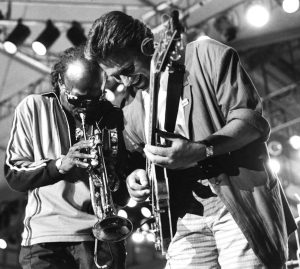 Did you get a supportive email from Roger Waters before your concerts in Palestine? He supports Palestinian people too.
Did you get a supportive email from Roger Waters before your concerts in Palestine? He supports Palestinian people too.
I have tried to contact Roger Waters. I know he does. He is very vocal. I wrote to his management because I suggested that we do a concert together. But I didn’t get any answer from his management. So, I don’t know what to do. I would be very happy to do a concert with him in Palestine.
Why the unconventional recording sessions of “Jack Johnson” (1971) album with Miles Davis have such a special place in your heart?
Very special, for at least two principal reasons. 1) The opening of the record is a physical “Right Off”. We didn’t have any music. We were all the musicians in the studio and Miles was talking to the producer (ed: Teo Macero) and talking and talking and after 20 minutes I was bored. So, I started to play this rhythm and blues shuffle, because I wanted to play. Billy Cobham was there, the first time I met him it was on “Jack Johnson” and I said: “Ok, let’s play something. I don’t care. Let’s have some fun in the studio. Miles is not here, but we can have fun”. I started to play this R&B beat and we hit a wonderful groove that you can hear on the record and Miles ran into the studio and played the next 10 minutes the most fantastic trumpet. 2) We finished the album and Miles said to everybody: “This is my favourite recording of all time”. Can you imagine? He said this to everybody. Yeah, amazing. So, I’m very much involved in the music itself and if you listen, as “Right Off” developed, there is like a dialogue starts to happen between Miles and me, with the trumpet and the guitar. This was so exciting for me, this moment in life. It’s all on the record. This recording is very-very special to me, because I am very much part of it.
Your old friend Miroslav Vitous (Weather Report, solo –bass) told me that jazz is dead, jazz is finished, because there aren’t great musical personalities like Herbie Hancock and Wayne Shorter anymore. Do you agree with this statement?
Yes, it’s true. I grew up with these people and they are beautiful human beings and very strong personalities. But don’t forget, since the last 10-12 years, there is no more record industry and so no instrumentalist can get a contract. So, how can they develop? They cannot develop as musicians or human beings, because their music doesn’t have a possibility. 20, 30, 40 years ago, it was a different world and we, musicians, were able to get a contract and with a contract, you have a record and you can do concerts. But today, it’s so difficult. The only way you get to know people, is on the Internet. But there are thousands and thousands of different bands on the Internet. How people can get to know you? It’s so difficult for the musicians. The young musicians today really suffer. Because they cannot develop their music, how can they develop their personalities? It’s very difficult. It’s a very hard road for the young musicians today. It’s really difficult. I try to help it, but believe me, it’s very hard.
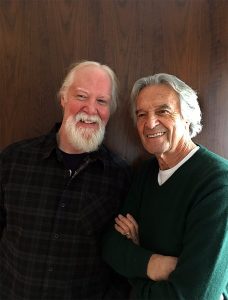 Is it true that you once said to Allan Holdsworth after a concert: “If I could understand something that you do, I would steal it”?
Is it true that you once said to Allan Holdsworth after a concert: “If I could understand something that you do, I would steal it”?
Absolutely true, yes (laughs)! I told him and he didn’t believe me. “If I knew what you are doing, I would steal everything, but I don’t know what you are doing. So, how can I steal it? It’s not possible”. Allan was beautiful. He was a very beautiful guitar player. Very wonderful.
Do you like Jeff Beck’s cover to “A Day in the Life”?
Yeah, fantastic! I heard him play it live. I just saw him, recently. Jeff I think is my all time favourite guitar player. He’s great guitar player. Really, so special.
A huge “THANK YOU” to Mr John McLaughlin for his time and to Mrs Ina McLaughlin for her valuable help.
Official John McLaughlin website: http://www.johnmclaughlin.com
Official John McLaughlin Facebook page: https://www.facebook.com/johnmclaughlinofficial

